Fleurs du Mal Magazine


“Printer’s ink is the greater explosive.”—Lawrence Ferlinghetti
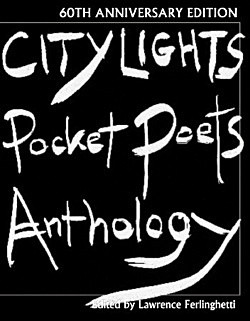 City Lights Pocket Poets Anthology
City Lights Pocket Poets Anthology
60th Anniversary Edition
Edited by Lawrence Ferlinghetti
A comprehensive selection from Ferlinghetti’s famed City Lights Pocket Poets Series, published on the 60th anniversary of its founding.
Lawrence Ferlinghetti founded the City Lights publishing house sixty years ago in 1955, launching the press with his now legendary Pocket Poets Series. First in the series was Pictures of the Gone World—and within a year, he had brought out two more volumes, translations by Kenneth Rexroth and 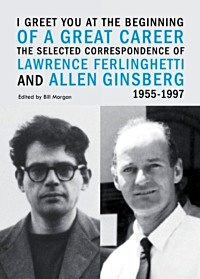 then, poems by Kenneth Patchen. But it was the success and scandal of Number Four, Howl & Other Poems by Allen Ginsberg (1956), that put City Lights on the map, positioning the Pocket Poets Series at the forefront of the literary counterculture.
then, poems by Kenneth Patchen. But it was the success and scandal of Number Four, Howl & Other Poems by Allen Ginsberg (1956), that put City Lights on the map, positioning the Pocket Poets Series at the forefront of the literary counterculture.
A landmark sixtieth retrospective celebrating 60 years of publishing and cultural history, this edition provides an invaluable distillation of the energetic, iconoclastic and still fresh body of work represented in the ongoing series. Ferlinghetti has selected a handful of poems from each of the sixty volumes, including the work of 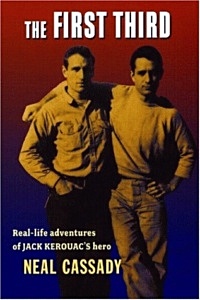 Ginsberg, Kerouac, Corso, Pasolini, Voznesensky, Prévert, Mayakovsky, Cortázar, O’Hara, Ponsot, Levertov, di Prima, Duncan, Lamantia, Lowry, and more, all of the Pocket Poets Series’ innovative, influential, and often ground-breaking American and international poets.
Ginsberg, Kerouac, Corso, Pasolini, Voznesensky, Prévert, Mayakovsky, Cortázar, O’Hara, Ponsot, Levertov, di Prima, Duncan, Lamantia, Lowry, and more, all of the Pocket Poets Series’ innovative, influential, and often ground-breaking American and international poets.
Founded in 1953 by poet Lawrence Ferlinghetti and Peter D. Martin, City Lights is one of the few truly great independent bookstores in the United States, a place where booklovers from across the country and around the world come to browse, read, and just soak in the ambiance of alternative culture’s only “Literary Landmark.”  Although it has been more than fifty years since tour buses with passengers eager to sight “beatniks” began pulling up in front of City Lights, the Beats’ legacy of anti-authoritarian politics and insurgent thinking continues to be a strong influence in the store, most evident in the selection of titles.
Although it has been more than fifty years since tour buses with passengers eager to sight “beatniks” began pulling up in front of City Lights, the Beats’ legacy of anti-authoritarian politics and insurgent thinking continues to be a strong influence in the store, most evident in the selection of titles.
Publisher City Lights Publishers
Format Hardcover, 306 p.
ISBN-10 0872866793
ISBN-13 9780872866799
# More information on website CITY LIGHT SAN FRANCISCO
fleursdumal.nl magazine
More in: - Book News, - Bookstores, Art & Literature News, BEAT GENERATION, Bob Dylan, Burroughs, William S., Ginsberg, Allen, Kerouac, Jack, Literary Events, Pier Paolo Pasolini, PRESS & PUBLISHING
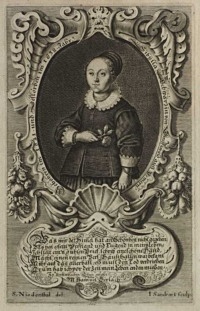
Sibylla Schwarz
Epigramma
Du meinst ich soll dein noch gedencken und dich lieben,
ob du mich schon verläst, ey sey doch nicht so toll,
Ich habe dir ja offt vor disem schon geschrieben:
Daß niemand Eysen, Stein und Klöze lieben soll.
Sibylla Schwarz (1621 – 1638)
Gedicht: Epigramma
fleursdumal.nl magazine
More in: Archive S-T, SIbylla Schwarz

Het International Literature Festival Utrecht (ILFU) vindt dit jaar plaats op 11, 12 en 13 mei in TivoliVredenburg.
Het is voor het eerst dat het festival op deze locatie plaatsvindt. Het festival brengt internationale romanschrijvers, vertalers en lezers bijeen, en geeft dit jaar vanwege de verhuizing naar TivoliVredenburg extra aandacht aan literatuur en muziek.
Met het toevoegen van Suzanne Vega, Sonja Barend, Hanna Bervoets, Marja Pruis, Mathilde Santing, Sun Li, Nelleke Noordervliet, Hugo Borst, Jean Kwok en Translating Bob Dylan is het indrukwekkende programma van het International Literature Festival Utrecht 2017 compleet.
ILFU #1: Donderdag 11 mei
Tim Parks, Rachel Cusk, Herman Koch en zijn vertalers, Translating Bob Dylan met Bindervoet en Henkes, Translating China, Translation Slam, Uitreiking Filter Vertaalprijs 2017, Awater Vertaald
ILFU #2: Vrijdag 12 mei
Graham Swift, Suzanne Vega, Sonja Barend, Samanta Schweblin, Hanna Bervoets, Mary Costello, Paulien Cornelisse, Jean Kwok, Prijsuitreiking schrijfwedstrijden, Xu Zechen, Sun Li
ILFU #3: Zaterdag 13 mei
Johan Harstad, Arjen Lubach, Nino Haratischwili, Jonas Hassen Khemiri, Nelleke Noordervliet, Marja Pruis, Hugo Borst, ILFU Colleges, Mathilde Santing & The Joni Mitchell Stories, Mini-colleges, Literaire Films, City of Literature, C.C.S. Crone Stipendia 2017.
International Literature Festival Utrecht (ILFU) op 11, 12 en 13 mei 2017 in TivoliVredenburg
# Meer info over International Literature Festival Utrecht (ILFU)
fleursdumal.nl magazine
More in: - Book Lovers, - Book News, Art & Literature News, Literary Events, MUSIC, THEATRE
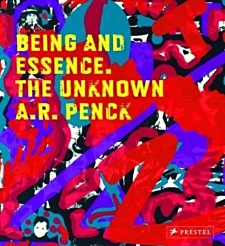 German Neo-Expressionist painter, sculptor and jazz drummer A.R. Penck has died in Zürich at the age of seventy seven. His German gallerist said the cause of his death was complications of a stroke.
German Neo-Expressionist painter, sculptor and jazz drummer A.R. Penck has died in Zürich at the age of seventy seven. His German gallerist said the cause of his death was complications of a stroke.
Ralf Winkler, alias A. R. Penck, was born in Dresden, Germany. After failing admission to the fine-arts academies in Dresden and East Berlin, Penck worked for several years in a lot of jobs.
In the early 1970s he met with a group of neo-expressionist painters in Dresden. Penck became later one of the exponents of the new figuration alongside with Jörg Immendorff, Georg Baselitz and Markus Lüpertz. In the late 1970s he was shown in West Berlin and was seen as an exponent of free speech in the East. In the 1980s Penck’s work was shown by major museums and galleries in the western world.
Ralf Winkler, alias A. R. Penck, Mike Hammer, T. M., Mickey Spilane, Theodor Marx, “a. Y.” or just “Y” died last week in Zürich.
In Memoriam A. R. Penck (1939–2017)
fleursdumal.nl magazine
More in: Art & Literature News, Exhibition Archive, Expressionisme, Galerie Deutschland, In Memoriam, REPRESSION OF WRITERS, JOURNALISTS & ARTISTS
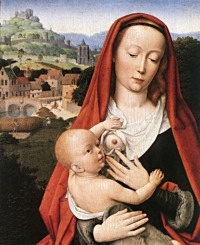 Iedereen weet hoe Maria eruitziet en zal haar beeltenis kunnen herkennen. Ook is bekend dat ze de moeder van Jezus is. Maar over haar leven weten we niet veel. Waarom is ze al eeuwenlang zo populair? Hoe doet ze dat? En wat zegt dat over ons?
Iedereen weet hoe Maria eruitziet en zal haar beeltenis kunnen herkennen. Ook is bekend dat ze de moeder van Jezus is. Maar over haar leven weten we niet veel. Waarom is ze al eeuwenlang zo populair? Hoe doet ze dat? En wat zegt dat over ons?
De tentoonstelling Maria blijft ruim 6 maanden open om heel Maria-minnend Nederland de kans te geven haar te ontmoeten. Want ongeacht cultuur of religie, Maria is van alle tijden en van iedereen. Mooie en verrassende verbeeldingen van Maria in de kunst vertellen haar meer dan wonderlijke levensverhaal. Ga met Maria op een inspirerende reis door twee millennia, vol nieuwe kennis en inzichten over de meest invloedrijke en meest afgebeelde vrouw ter wereld.
Maria brengt veel fascinerende Maria’s uit nationale en internationale collecties samen, waarbij gekozen is voor spannende combinaties. Er komen schitterende Maria’s uit o.a. de Koninklijke Musea voor Schone Kunsten van België, Museum Boijmans van Beuningen, het Van Gogh Museum, het Mauritshuis en natuurlijk uit Museum Catharijneconvent zelf.
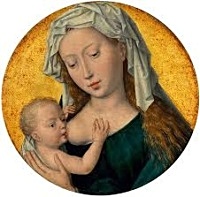 Ontdek hoe veelzijdig deze wereldvrouw is: zij is onderwerp van ikonen en schilderijen, manuscripten, sculpturen, tatoeages en video-installaties. En het zijn niet de minsten die zich door Maria lieten inspireren: o.a. Rubens, Pieter de Grebber, Rembrandt, Jan Toorop, Bill Viola, Jan Fabre en Maria Roosen zijn vertegenwoordigd.
Ontdek hoe veelzijdig deze wereldvrouw is: zij is onderwerp van ikonen en schilderijen, manuscripten, sculpturen, tatoeages en video-installaties. En het zijn niet de minsten die zich door Maria lieten inspireren: o.a. Rubens, Pieter de Grebber, Rembrandt, Jan Toorop, Bill Viola, Jan Fabre en Maria Roosen zijn vertegenwoordigd.
Maria’s wonderlijke levensverhaal loopt als een rode draad door de tentoonstelling die de gehele bovenverdieping van het museum beslaat. Vanaf de conceptie tot aan haar tenhemelopneming is Maria in uitingen van kunst te volgen. Ook thema’s als devotie en bedevaart passeren de revue. De tentoonstelling laat zien hoe zeer Maria een mondiaal symbool is voor liefde, vrouw-zijn, gezin, angst, verdriet, troost en bescherming.
Waarom is Maria misschien wel de machtigste vrouw op de wereld? In ieder geval de meest afgebeelde vrouw en moeder, daar kan geen popster tegenop. Je zou haar een cultureel fenomeen kunnen noemen. U ontmoet Maria ook in relatie tot andere hedendaagse religies. Maria komt zelfs meer voor in de Koran dan in de Bijbel.
Het gevoel, de warme associaties en emoties die Maria oproept komen in de tentoonstelling naar voren in de persoonlijke verhalen of ervaringen van diverse bekende en onbekende Nederlanders. Deze verhalen komen samen in bijzondere filmpjes die door de tentoonstelling heen verweven zijn.
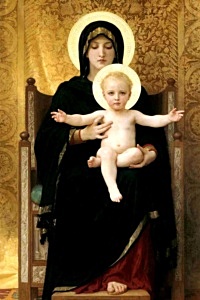 Geen dag zonder Maria is een reis door het hele jaar, waarbij de lezer elke dag wordt verrast door Maria: met een feest of een legende, een mooi gedicht of gebed, een opmerkelijk weetje, een Mariaverschijning, een lach en een traan, een bijzonder recept. Het boek laat zien waar de wereldwijde verering van Maria vandaan komt en hoe Maria mensen tot op de dag van vandaag inspireert. Dit rijk geïllustreerde boek is vanaf 10 februari in de museumshop verkrijgbaar. Prijs: € 24,95
Geen dag zonder Maria is een reis door het hele jaar, waarbij de lezer elke dag wordt verrast door Maria: met een feest of een legende, een mooi gedicht of gebed, een opmerkelijk weetje, een Mariaverschijning, een lach en een traan, een bijzonder recept. Het boek laat zien waar de wereldwijde verering van Maria vandaan komt en hoe Maria mensen tot op de dag van vandaag inspireert. Dit rijk geïllustreerde boek is vanaf 10 februari in de museumshop verkrijgbaar. Prijs: € 24,95
Sinds de start bezochten al ruim 30.000 mensen de tentoonstelling Maria. De grootste tentoonstelling uit de geschiedenis van Museum Catharijneconvent is met recht een succes te noemen. Het veelbewogen leven van Maria, verbeeld door beroemde kunstenaars als Joos van Cleve, Rubens, Rembrandt, Jan Toorop en Bill Viola, weet mensen tot vandaag de dag nog steeds te raken.
Nog te zien t/m 20 augustus 2017
Tentoonstelling: Maria
Museum Catharijneconvent
Lange Nieuwstraat 38
3512 PH Utrecht
Bel: 030 231 38 35
info@catharijneconvent.nl
# meer info op website Museum Catharijneconvent
fleursdumal.nl magazine
More in: - Book News, Art & Literature News, CATHEDRALS, DICTIONARY OF IDEAS, Exhibition Archive, FDM Art Gallery, The Ideal Woman
 Edgar Allan Poe
Edgar Allan Poe
The Tell Tale Heart
Trua! nervous, very, very dreadfully nervous I had been and am; but why Will you say that I am mad? The disease had sharpened my senses, not destroyed, not dulled them. Above all was the sense of hearing acute. I heard all things in the heaven and in the earth. I heard many things in hell. How then am I mad? Hearken! and observe how healthily, how calmly, I can tell you the whole story.
It is impossible to say how first the idea entered my brain, but, once conceived, it haunted me day and night. Object there was none. Passion there was none. I loved the old man. He had never wronged me. He had never given me insult. For his gold I had no desire. I think it was his eye! Yes, it was this! One of his eyes resembled that of a vulture a pale blue eye with a film over it. Whenever it fell upon me my blood ran cold, and so by degrees, very gradually, I made up my mind to take the life of the old man, and thus rid myself of the eye for ever.
Now this is the point. You fancy me mad. Madmen know nothing. But you should have seen me. You should have seen how wisely I proceeded with what caution with what foresight, with what dissimulation, I went to work! I was never kinder to the old man than during the whole week before I killed him. And every night about midnight I turned the latch of his door and opened it oh, so gently! And then, when I had made an opening sufficient for my head, I put in a dark lantern all closed, closed so that no light shone out, and then I thrust in my head. Oh, you would have laughed to see how cunningly I thrust it in! I moved it slowly, very, very slowly, so that I might not disturb the old man’s sleep. It took me an hour to place my whole head within the opening so far that I could see him as he lay upon his bed. Ha! would a madman have been so wise as this? And then when my head was well in the room I undid the lantern cautiously oh, so cautiously cautiously (for the hinges creaked), I undid it just so much that a single thin ray fell upon the vulture eye. And this I did for seven long nights, every night just at midnight, but I found the eye always closed, and so it was impossible to do the work, for it was not the old man who vexed me but his Evil Eye. And every morning, when the day broke, I went boldly into the chamber and spoke courageously to him, calling him by name in a hearty tone, and inquiring how he had passed the night. So you see he would have been a very profound old man, indeed , to suspect that every night, just at twelve, I looked in upon him while he slept.
Upon the eighth night I was more than usually cautious in opening the door. A watch’s minute hand moves more quickly than did mine. Never before that night had I felt the extent of my own powers, of my sagacity. I could scarcely contain my feelings of triumph. To think that there I was opening the door little by little, and he not even to dream of my secret deeds or thoughts. I fairly chuckled at the idea, and perhaps he heard me, for he moved on the bed suddenly as if startled. Now you may think that I drew back — but no. His room was as black as pitch with the thick darkness (for the shutters were close fastened through fear of robbers), and so I knew that he could not see the opening of the door, and I kept pushing it on steadily, steadily.
I had my head in, and was about to open the lantern, when my thumb slipped upon the tin fastening , and the old man sprang up in the bed, crying out, “Who’s there?”
I kept quite still and said nothing. For a whole hour I did not move a muscle, and in the meantime I did not hear him lie down. He was still sitting up in the bed, listening; just as I have done night after night hearkening to the death watches in the wall.
Presently, I heard a slight groan, and I knew it was the groan of mortal terror. It was not a groan of pain or of grief — oh, no! It was the low stifled sound that arises from the bottom of the soul when overcharged with awe. I knew the sound well. Many a night, just at midnight, when all the world slept, it has welled up from my own bosom, deepening, with its dreadful echo, the terrors that distracted me. I say I knew it well. I knew what the old man felt, and pitied him although I chuckled at heart. I knew that he had been lying awake ever since the first slight noise when he had turned in the bed. His fears had been ever since growing upon him. He had been trying to fancy them causeless, but could not. He had been saying to himself, “It is nothing but the wind in the chimney, it is only a mouse crossing the floor,” or, “It is merely a cricket which has made a single chirp.” Yes he has been trying to comfort himself with these suppositions ; but he had found all in vain. All in vain, because Death in approaching him had stalked with his black shadow before him and enveloped the victim. And it was the mournful influence of the unperceived shadow that caused him to feel, although he neither saw nor heard, to feel the presence of my head within the room.
When I had waited a long time very patiently without hearing him lie down, I resolved to open a little a very, very little crevice in the lantern. So I opened it you cannot imagine how stealthily, stealthily until at length a single dim ray like the thread of the spider shot out from the crevice and fell upon the vulture eye.
It was open, wide, wide open, and I grew furious as I gazed upon it. I saw it with perfect distinctness all a dull blue with a hideous veil over it that chilled the very marrow in my bones, but I could see nothing else of the old man’s face or person, for I had directed the ray as if by instinct precisely upon the damned spot.
And now have I not told you that what you mistake for madness is but over-acuteness of the senses? now, I say, there came to my ears a low, dull, quick sound, such as a watch makes when enveloped in cotton. I knew that sound well too. It was the beating of the old man’s heart. It increased my fury as the beating of a drum stimulates the soldier into courage.
But even yet I refrained and kept still. I scarcely breathed. I held the lantern motionless. I tried how steadily I could maintain the ray upon the eye. Meantime the hellish tattoo of the heart increased. It grew quicker and quicker, and louder and louder, every instant. The old man’s terror must have been extreme! It grew louder, I say, louder every moment! do you mark me well? I have told you that I am nervous: so I am. And now at the dead hour of the night, amid the dreadful silence of that old house, so strange a noise as this excited me to uncontrollable terror. Yet, for some minutes longer I refrained and stood still. But the beating grew louder, louder! I thought the heart must burst. And now a new anxiety seized me the sound would be heard by a neighbour! The old man’s hour had come! With a loud yell, I threw open the lantern and leaped into the room. He shrieked once once only. In an instant I dragged him to the floor, and pulled the heavy bed over him. I then smiled gaily, to find the deed so far done. But for many minutes the heart beat on with a muffled sound. This, however, did not vex me; it would not be heard through the wall. At length it ceased. The old man was dead. I removed the bed and examined the corpse. Yes, he was stone, stone dead. I placed my hand upon the heart and held it there many minutes. There was no pulsation. He was stone dead. His eye would trouble me no more.
If still you think me mad, you will think so no longer when I describe the wise precautions I took for the concealment of the body. The night waned, and I worked hastily, but in silence.
I took up three planks from the flooring of the chamber, and deposited all between the scantlings. I then replaced the boards so cleverly so cunningly, that no human eye not even his could have detected anything wrong. There was nothing to wash out no stain of any kind no blood-spot whatever. I had been too wary for that.
When I had made an end of these labours, it was four o’clock still dark as midnight. As the bell sounded the hour, there came a knocking at the street door. I went down to open it with a light heart, for what had I now to fear? There entered three men, who introduced themselves, with perfect suavity, as officers of the police. A shriek had been heard by a neighbour during the night; suspicion of foul play had been aroused; information had been lodged at the police office, and they (the officers) had been deputed to search the premises.
I smiled, for what had I to fear? I bade the gentlemen welcome. The shriek, I said, was my own in a dream. The old man, I mentioned, was absent in the country. I took my visitors all over the house. I bade them search search well. I led them, at length, to his chamber. I showed them his treasures, secure, undisturbed. In the enthusiasm of my confidence, I brought chairs into the room, and desired them here to rest from their fatigues, while I myself, in the wild audacity of my perfect triumph, placed my own seat upon the very spot beneath which reposed the corpse of the victim.
The officers were satisfied. My manner had convinced them. I was singularly at ease. They sat and while I answered cheerily, they chatted of familiar things. But, ere long, I felt myself getting pale and wished them gone. My head ached, and I fancied a ringing in my ears; but still they sat, and still chatted. The ringing became more distinct : I talked more freely to get rid of the feeling: but it continued and gained definitiveness until, at length, I found that the noise was not within my ears.
No doubt I now grew very pale; but I talked more fluently, and with a heightened voice. Yet the sound increased and what could I do? It was a low dull, quick sound much such a sound as a watch makes when enveloped in cotton. I gasped for breath, and yet the officers heard it not. I talked more quickly, more vehemently but the noise steadily increased. I arose and argued about trifles, in a high key and with violent gesticulations; but the noise steadily increased. Why would they not be gone? I paced the floor to and fro with heavy strides, as if excited to fury by the observations of the men, but the noise steadily increased. O God! what could I do? I foamed I raved I swore! I swung the chair upon which I had been sitting, and grated it upon the boards, but the noise arose over all and continually increased. It grew louder louder louder! And still the men chatted pleasantly , and smiled. Was it possible they heard not? Almighty God! no, no? They heard! they suspected! they knew! they were making a mockery of my horror! this I thought, and this I think. But anything was better than this agony! Anything was more tolerable than this derision! I could bear those hypocritical smiles no longer! I felt that I must scream or die! and now again hark! louder! louder! louder! Louder!
“Villains!” I shrieked, “dissemble no more! I admit the deed! tear up the planks! Here, here! It is the beating of his hideous heart!”
Edgar Allan Poe (1809 – 1849)
The Tell Tale Heart
fleursdumal.nl magazine
More in: Edgar Allan Poe, Poe, Edgar Allan, Poe, Edgar Allan
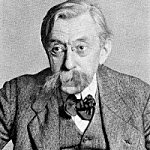
Emile Verhaeren
La morte
En sa robe, couleur de feu et de poison,
Le cadavre de ma raison
Traîne sur la Tamise.
Des ponts de bronze, où les wagons
Entrechoquent d’interminables bruits de gonds
Et des voiles de bâteaux sombres
Laissent sur elle, choir leurs ombres.
Sans qu’une aiguille, à son cadran, ne bouge,
Un grand beffroi masqué de rouge,
La regarde, comme quelqu’un
Immensément de triste et de défunt.
Elle est morte de trop savoir,
De trop vouloir sculpter la cause,
Dans le socle de granit noir,
De chaque être et de chaque chose.
Elle est morte, atrocement,
D’un savant empoisonnement,
Elle est morte aussi d’un délire
Vers un absurde et rouge empire.
Ses nerfs ont éclaté,
Tel soir illuminé de fête,
Qu’elle sentait déjà le triomphe flotter
Comme des aigles, sur sa tête.
Elle est morte n’en pouvant plus,
L’ardeur et les vouloirs moulus,
Et c’est elle qui s’est tuée,
Infiniment exténuée.
Au long des funèbres murailles,
Au long des usines de fer
Dont les marteaux tannent l’éclair,
Elle se traîne aux funérailles.
Ce sont des quais et des casernes,
Des quais toujours et leurs lanternes,
Immobiles et lentes filandières
Des ors obscurs de leurs lumières ;
Ce sont des tristesses de pierres,
Maisons de briques, donjons en noir
Dont les vitres, mornes paupières,
S’ouvrent dans le brouillard du soir ;
Ce sont de grands chantiers d’affolement,
Pleins de barques démantelées
Et de vergues écartelées
Sur un ciel de crucifiement.
En sa robe de joyaux morts, que solennise
L’heure de pourpre à l’horizon,
Le cadavre de ma raison
Traîne sur la Tamise.
Elle s’en va vers les hasards
Au fond de l’ombre et des brouillards,
Au long bruit sourd des tocsins lourds,
Cassant leur aile, au coin des tours.
Derrière elle, laissant inassouvie
La ville immense de la vie ;
Elle s’en va vers l’inconnu noir
Dormir en des tombeaux de soir,
Là-bas, où les vagues lentes et fortes,
Ouvrant leurs trous illimités,
Engloutissent à toute éternité :
Les mortes.
Emile Verhaeren (1855-1916) poésie
fleursdumal.nl magazine
More in: Archive U-V, Verhaeren, Emile
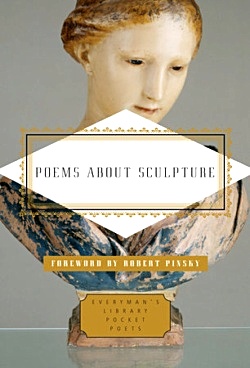 Poems About Sculpture
Poems About Sculpture
Foreword by Robert Pinsky & Edited by Murray Dewart
Poems About Sculpture is a unique anthology of poems from around the world and across the ages about our most enduring art form.
About Poems
About Sculpture
Sculpture has the longest memory of the arts: from the Paleolithic era, we find stone carvings and clay figures embedded with human longing. And poets have long been fascinated by the idea of eternity embodied by the monumental temples and fragmented statues of ancient civilizations. From Keats’s Grecian urn and Shelley’s “Ozymandias” to contemporary verse about Maya Lin’s Vietnam Veterans Memorial and Janet Echelman’s wind-borne hovering nets, the pieces in this collection convert the physical materials of the plastic arts—clay, wood, glass, marble, granite, bronze, and more—into lapidary lines of poetry. Whether the sculptures celebrated here commemorate love or war, objects or apparitions, forms human or divine, they have called forth evocative responses from a wide range of poets, including Homer, Ovid, Shakespeare, Baudelaire, Rilke, Dickinson, Yeats, Auden, and Plath. A compendium of dazzling examples of one art form reflecting on another, Poems About Sculpture is a treat for art lovers of all kinds.
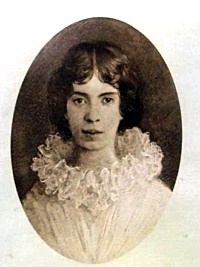
Dare You See A Soul At The White Heat?
Dare you see a Soul at the White Heat?
Then crouch within the door—
Red—is the Fire’s common tint—
But when the vivid Ore
Has vanquished Flame’s conditions,
It quivers from the Forge
Without a color, but the light
Of unanointed Blaze.
Least Village has its Blacksmith
Whose Anvil’s even ring
Stands symbol for the finer Forge
That soundless tugs—within—
Refining these impatient Ores
With Hammer, and with Blaze
Until the Designated Light
Repudiate the Forge—
Emily Dickinson
(1830 – 1886)

La Beauté
Je suis belle, ô mortels! comme un rêve de pierre,
Et mon sein, où chacun s’est meurtri tour à tour,
Est fait pour inspirer au poète un amour
Eternel et muet ainsi que la matière.
Je trône dans l’azur comme un sphinx incompris;
J’unis un coeur de neige à la blancheur des cygnes;
Je hais le mouvement qui déplace les lignes,
Et jamais je ne pleure et jamais je ne ris.
Les poètes, devant mes grandes attitudes,
Que j’ai l’air d’emprunter aux plus fiers monuments,
Consumeront leurs jours en d’austères études;
Car j’ai, pour fasciner ces dociles amants,
De purs miroirs qui font toutes choses plus belles:
Mes yeux, mes larges yeux aux clartés éternelles!
Charles Baudelaire
(1821 – 1867)
Poems About Sculpture
Foreword by Robert Pinsky
Edited by Murray Dewart
Hardcover, 256 p.
ISBN 9781101907757
Publ. by Everyman’s Library, 2016
fleursdumal.nl magazine
More in: - Book News, Art & Literature News, Baudelaire, Charles, Dickinson, Emily, Museum of Literary Treasures, POETRY ARCHIVE, Sculpture
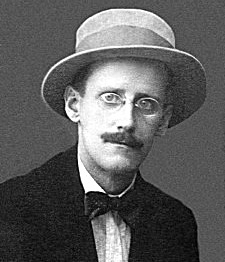
James Joyce
Simples
O bella bionda,
Sei come l’onda!
Of cool sweet dew and radiance mild
The moon a web of silence weaves
In the still garden where a child
Gathers the simple salad leaves.
A moondew stars her hanging hair
And moonlight kisses her young brow
And, gathering, she sings an air:
Fair as the wave is, fair, art thou!
Be mine, I pray, a waxen ear
To shield me from her childish croon
And mine a shielded heart for her
Who gathers simples of the moon.
James Joyce (1882 – 1941)
Simples
fleursdumal.nl magazine
More in: Archive I-J, Joyce, James, Joyce, James
Thank you for reading Fleurs du Mal - magazine for art & literature